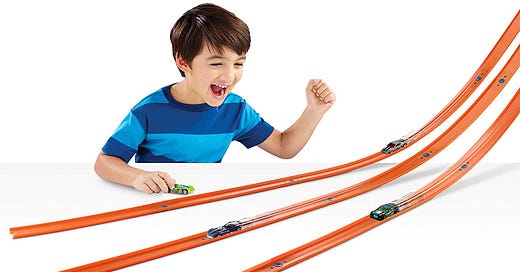This past weekend was Father’s Day here in the U.S. So happy belated Father’s Day to all the dads out there.
A friend shared a parenting story over the weekend in light of Father’s Day. He was getting his son ready for bed, and his son wanted to send a race car down the track one last time before getting pajamas on. But the car didn’t go down the track right, so the kid went to do it again. My friend told him no, it was time to get ready for bed. This led to a fit and some fighting, before his son went ahead sent the car down the track again, anyway. Something many of us probably know all too well, especially at bedtime.
My friend told his son that because he didn’t obey, he was going to take away the race track for a day so he couldn’t use it. Actions have consequences, and all the parenting lessons, etc.
That was the moral of the story I think. But I have to side with the kid on this one.
Aside from the unclear consequences, I can empathize with being a parent at bedtime. The struggle is real! Kids don’t want to go to bed. Ever. And that’s all that we want at parents sometimes.
But I’m still with the kid. Maybe it comes from having kids who think the same. Maybe it’s from being a product manager for so long. Unarticulated, but assumed by kids, is that they are getting an outcome, not an output.
It’s not about sending down a race car one more time, it’s about the red car beating the blue car because that’s the favorite. Or it’s about the marbles going down the favorite path of the marble maze. Or about the rube goldberg machine falling in the right way. They don’t care (at least not in our house) about “just one more time”. They care about “one more good outcome”.
It’s a hard thing to learn and understand. But it’s a game-changer.
As product people, this may be easier for us to get at times. But we can lose sight of it too.
Our users don’t care about the outputs of our products. They care about the outcomes they get from using them.
One product that I managed output a lot of data. It showed users all sorts of information about device statuses, past and current health checks, location information, etc. But the information wasn’t very usable. As much as it output, it didn’t help users with any meaningful outcome. It didn’t easily answer questions like “what should I pay attention to right now?” and “what has changed meaningfully?”. For that reason, despite having lots of outputs, it didn’t help with outcomes. And for that reason wasn’t used frequently.
Similarly, when I go into an app or get a product, I usually have something I want to accomplish. It doesn’t matter if the product can do 1,000 things. If it can’t accomplish the job I need it to, I’ll probably be upset, like the kid with the race track.
Finally, we often sell products based largely on features, rather than outcomes. We try and force the conversation more to “going down the track” rather than “the red car winning”. Part of that is because we’re all drawn to features. “Look at all the different tracks we have!” But ultimately, for us and for our users, the outcome will be more important. All the tracks won’t matter if they can’t go down the one that makes the most sense. And it will lead to everyone being unhappy.
As product people (and as parents), we need to empathize with our users (and kids). It’s not about the feature, or taking one more turn, it’s about getting one more good outcome. Sometimes we have to shift our perspective to remember that.
Good Reads, Listens, and Videos
Sherlock Holmes Revisited: 6 Lessons for Product People (article) - Somewhere between “ineffable twaddle” and “necromancer” lies the timeless character of Sherlock Holmes, who continues to occupy our imaginations and our screens in various incarnations. But aside from the deeply deductive and yet often erratic behavior, what can we “normal” people learn from the storied sleuth? That is what I wanted to know as I read (and re-read) Conan Doyle’s works. I came away with many lessons that we as product people can apply.
Supreme Court win for college athletes in compensation case (article) - The system we have in the U.S. still seems bizarre to me. Viewed through the lens of tradition, it may seem normal. But if you step back for a moment, we have young athletes competing at the highest levels without getting paid. It seems absurd. In soccer in other countries, these athletes could already be signing multi-million dollar deals. But here we force them to continue to risk their health for a shot at a big payday that most of them will never get. This is a step in the right direction, but doesn’t go nearly far enough.
It’s not a ‘Labor Shortage’ (article) - We’ve been having this debate recently. What has caused the “labor shortage”? It feels more like a shift in the market. Driven partly by unemployment benefits and the opportunity to shift away from temporary jobs. It will be interesting how this plays out.
Retail workers are quitting at record rates for higher-paying work: ‘My life isn’t worth a dead-end job’ (article) - “Retail workers, drained from the pandemic and empowered by a strengthening job market, are leaving jobs like never before.”





![Amazon.com: Hot Wheels Car & Mega Track Pack [Amazon Exclusive]: Toys & Games Amazon.com: Hot Wheels Car & Mega Track Pack [Amazon Exclusive]: Toys & Games](https://substackcdn.com/image/fetch/$s_!E3Hv!,w_1456,c_limit,f_auto,q_auto:good,fl_progressive:steep/https%3A%2F%2Fbucketeer-e05bbc84-baa3-437e-9518-adb32be77984.s3.amazonaws.com%2Fpublic%2Fimages%2Fd7a0c4d9-d253-407d-b15c-ea5870388a4f_1500x964.jpeg)